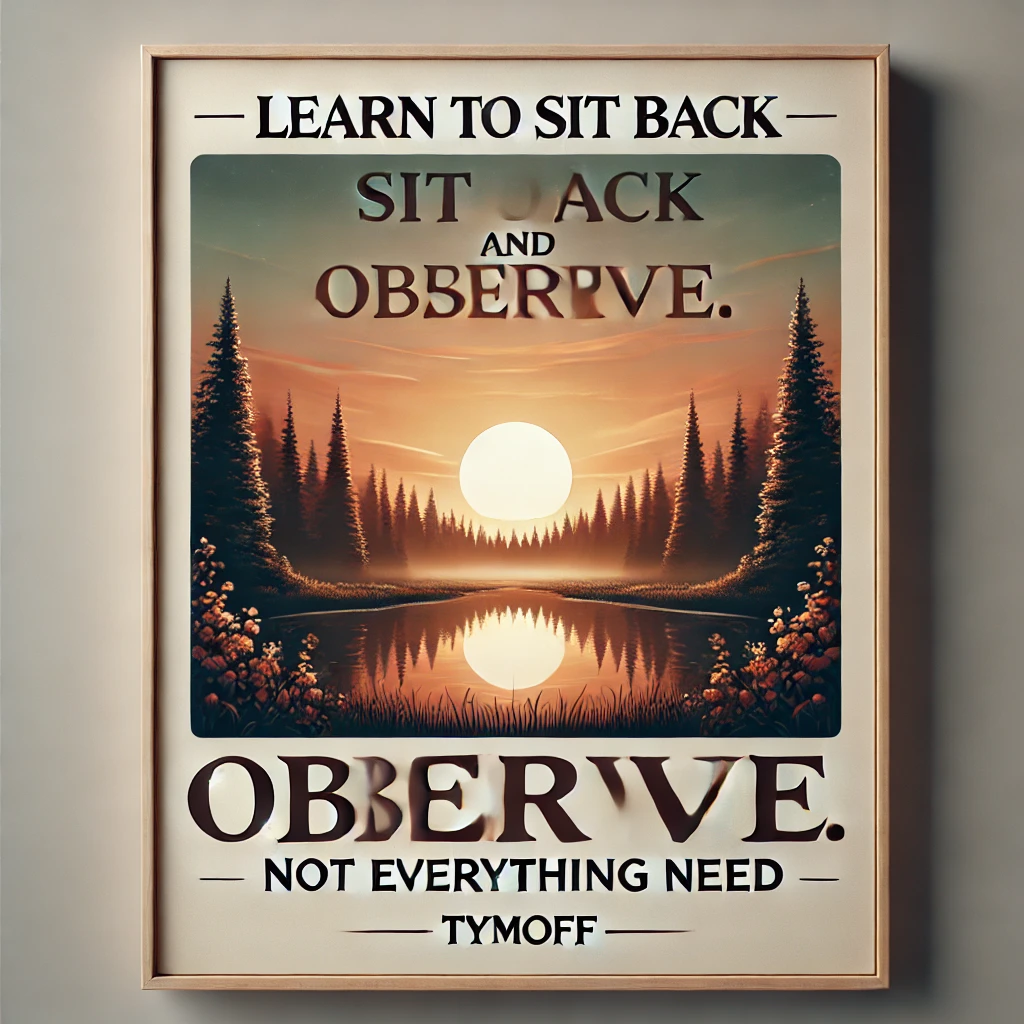Learn To Sit Back And Observe. Not Everything Need – Tymoff
In today’s fast-paced world, where we are constantly bombarded with information, expectations, and obligations, it is crucial to develop the ability to step back and take a breather. The phrase “learn to sit back and observe. not everything need – tymoff” encapsulates the essence of mindfulness and the importance of reflection in our daily lives. In this article, we will explore the significance of observation, the benefits it brings, and practical ways to implement this philosophy in our busy lives.
The Importance of Observation
Observation is often overlooked in our daily routines. We tend to rush from one task to another, focusing solely on what needs to be done rather than taking a moment to observe our surroundings, emotions, and experiences. However, learning to sit back and observe allows us to gain a deeper understanding of ourselves and the world around us.
Mindfulness in Everyday Life
Mindfulness, the practice of being fully present in the moment, is a cornerstone of observation. When we take the time to sit back and observe, we cultivate mindfulness. This practice can significantly impact our mental and emotional well-being. By paying attention to our thoughts, feelings, and physical sensations without judgment, we develop a greater awareness of our inner selves.
Developing Emotional Intelligence
Emotional intelligence involves recognizing and understanding our emotions and those of others. By observing our emotional responses to various situations, we can enhance our emotional intelligence. This skill enables us to respond thoughtfully rather than react impulsively, leading to healthier relationships and improved communication.
The Power of Reflection
Reflection is a crucial aspect of observation. When we take the time to reflect on our experiences, we can extract valuable lessons and insights. Instead of merely going through the motions of life, we can learn from our successes and failures, helping us grow personally and professionally.

The Benefits of Sitting Back and Observing
Reduced Stress: Taking a moment to sit back and observe can help alleviate stress. When we pause, we allow ourselves to breathe and reset our minds. This practice can reduce anxiety and create a sense of calm in our lives.
Improved Decision-Making: By observing situations without immediate reaction, we gain clarity. This clarity helps us make more informed decisions rather than impulsively responding to circumstances.
Enhanced Creativity: Observation can fuel creativity. When we take the time to observe our surroundings, we open ourselves up to new ideas and perspectives. This newfound inspiration can lead to innovative solutions and creative breakthroughs.
Better Relationships: By learning to observe rather than judge, we can improve our interactions with others. Taking a step back allows us to listen actively and respond thoughtfully, fostering deeper connections and understanding.
Increased Productivity: Paradoxically, taking breaks to observe can enhance our productivity. When we allow ourselves moments of reflection, we return to our tasks with renewed focus and energy.
Practical Ways to Implement Observation in Your Life
Now that we understand the importance and benefits of observation, let’s explore some practical ways to implement this philosophy in our lives.
Practice Mindfulness Meditation
Mindfulness meditation is a powerful tool for developing observation skills. Set aside a few minutes each day to sit in a quiet space, close your eyes, and focus on your breath. When thoughts arise, acknowledge them without judgment and gently bring your focus back to your breath. This practice enhances your ability to observe your thoughts and feelings with clarity.
Take Regular Breaks
Incorporate short breaks into your daily routine. During these breaks, step away from your tasks and take a moment to observe your surroundings. Notice the sounds, sights, and smells around you. This practice can refresh your mind and improve your focus when you return to work.
Engage in Nature Observation
Nature has a unique way of grounding us. Spend time outdoors, whether it’s in a park, garden, or forest. Take a moment to observe the beauty of nature—the colors of the leaves, the sound of birds chirping, or the feel of the breeze on your skin. Engaging with nature can help you reconnect with the present moment.
Journal Your Observations
Keeping a journal can enhance your observational skills. Take a few minutes each day to write about your experiences, thoughts, and feelings. Reflect on what you observed throughout the day—how you reacted to certain situations and what you learned. This practice can deepen your understanding of yourself and your surroundings.
Limit Multitasking
In our quest to be more productive, we often fall into the trap of multitasking. However, multitasking can lead to a lack of focus and mindfulness. Instead, try to focus on one task at a time. When you concentrate fully on a single task, you can observe the nuances and details that often go unnoticed.
Cultivate Active Listening
In conversations, practice active listening. Instead of thinking about your response while the other person is speaking, focus entirely on what they are saying. Observe their body language, tone, and emotions. This practice not only improves your observational skills but also enhances your relationships.
Embrace Silence
In a world filled with noise and distractions, embracing silence can be a powerful form of observation. Spend time in silence, whether through meditation, quiet walks, or simply sitting in a peaceful space. This allows your mind to clear, making space for deeper observation and reflection.
Reflect on Your Experiences
Set aside time each week to reflect on your experiences. Ask yourself questions about what you learned, how you felt, and what you could do differently in similar situations. This reflection reinforces the habit of observation and helps you grow from your experiences.
Conclusion
Incorporating the principle of “learn to sit back and observe. not everything need – tymoff” into our lives can lead to profound personal growth and improved well-being. By taking the time to step back, observe, and reflect, we cultivate mindfulness, enhance our emotional intelligence, and develop deeper connections with ourselves and others.
As we navigate the complexities of modern life, embracing observation can serve as a guiding light, helping us find balance, clarity, and a greater appreciation for the present moment. So, the next time you feel overwhelmed or rushed, remember the power of observation and the importance of sitting back and taking a breath.
4o mini






Leave a Reply